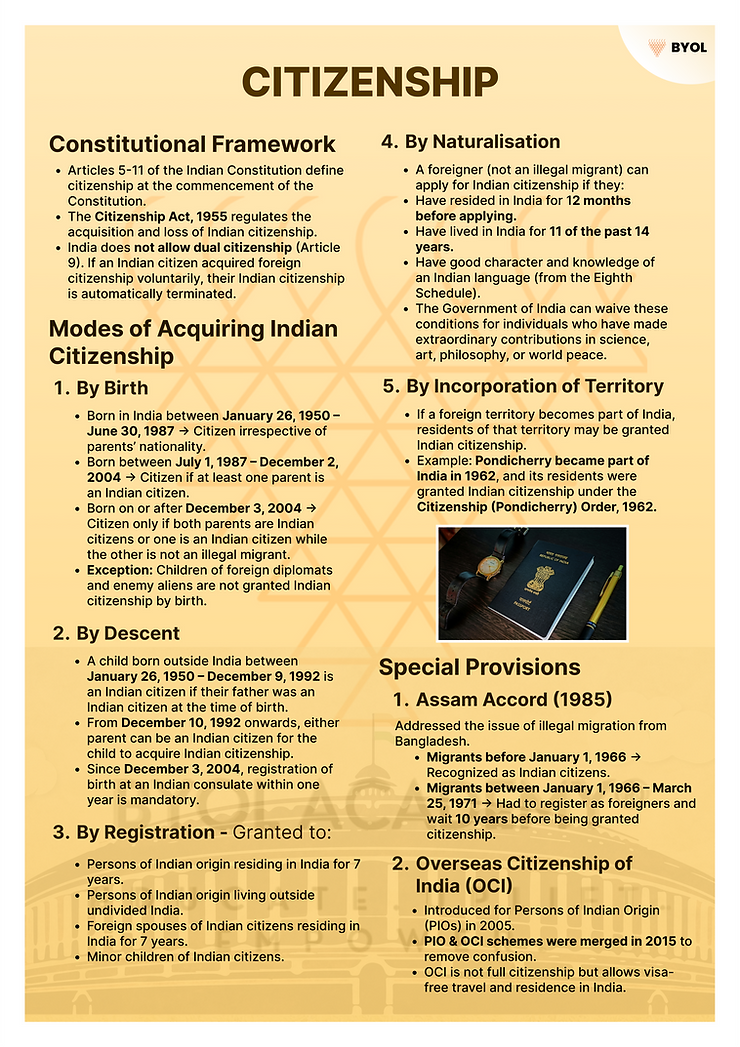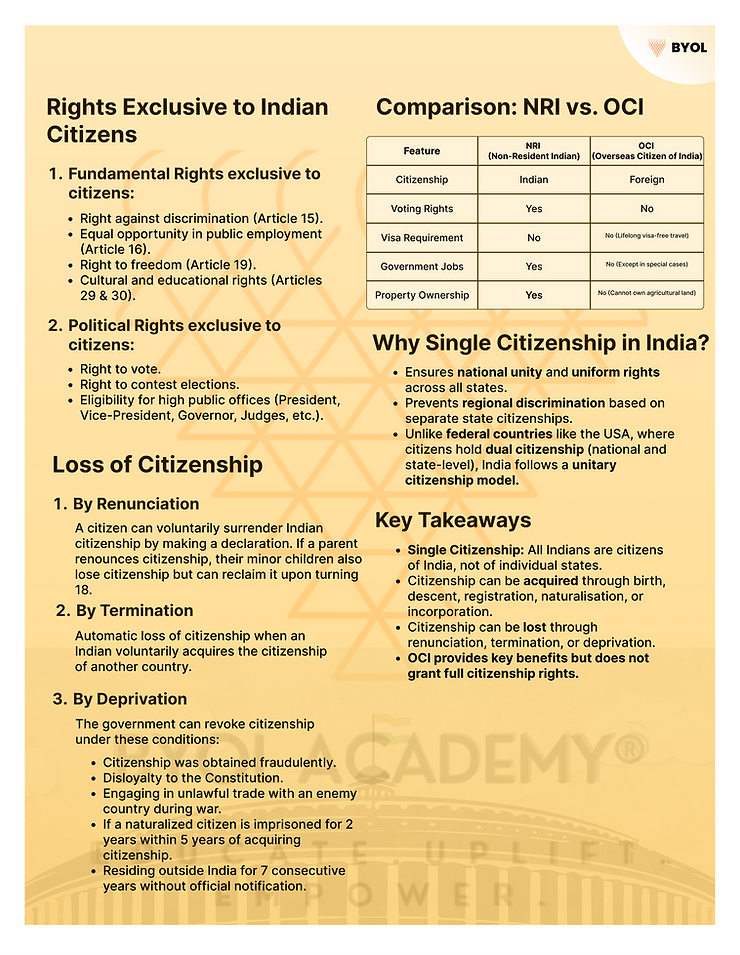Introduction
Citizenship defines an individual’s legal status, rights, and duties within a country. In India, Articles 5-11 of the Constitution and the Citizenship Act, 1955 govern citizenship, which is strictly single (no dual citizenship as per Article 9). To strengthen ties with the Indian diaspora, India introduced Overseas Citizenship of India (OCI) and merged the Person of Indian Origin (PIO) scheme in 2015. Understanding citizenship is vital for national identity, legal rights, and foreign relations.
Significance and Meaning
There are two categories of individuals in India: citizens and foreigners.
- Citizens: Enjoy all civil and political rights as full members of the Indian State.
- Aliens: People from other countries don’t have all the rights.
- Friendly Aliens: People from nations with friendly ties to India.
- Citizens of nations at war with India are considered enemy aliens and are granted less rights, such as the inability to be arrested or detained under Article 22.
Privileges and Rights Only to Indian nationals
- Article 15: Right against discrimination.
- Article 16 guarantees the right to equal opportunities in public employment.
- Article 19 guarantees the right to fundamental freedoms, including the freedom of expression, assembly, association, movement, residence, and profession.
- Cultural & educational rights (Articles 29 & 30).
- Right to vote in Lok Sabha & State Assembly elections.
- Right to contest elections for Parliament & State Legislatures.
- Eligibility for high public offices, including:
- President, Vice-President
- Supreme Court & High Court Judges
- Governor of States
- Attorney General of India & Advocate General of States
Duties of Citizens
- Paying taxes.
- Respecting the National Flag & National Anthem.
- Defending the country.
Comparative Perspective
- India: Both citizens by birth and naturalized citizens are eligible for the office of President.
- USA: Only citizens by birth can become President.
Citizenship Provisions of the Constitution
Although it lacks permanent or comprehensive laws on the topic, the Indian Constitution provides the basis for defining Indian citizenship. Rather, it gives Parliament the power to enact laws that govern citizenship. In order to handle the acquisition and loss of Indian citizenship, the Citizenship Act of 1955 was passed.
Articles 5 to 11: Citizenship at the Commencement of the Constitution
At the time of India’s independence, the Constitution granted citizenship to four categories of people on January 26, 1950:
- Persons domiciled in India
- Anyone who had domicile in India and met any one of the following conditions:
- Born in India.
- Either parent was born in India.
- Ordinarily resident in India for five years before January 26, 1950.
- Anyone who had domicile in India and met any one of the following conditions:
- Persons migrating from Pakistan to India
- If migrated before July 19, 1948 → Became a citizen if ordinarily resident in India since migration.
- If migrated on or after July 19, 1948 → Had to register as an Indian citizen after residing in India for six months.
- Persons who migrated to Pakistan but returned to India
- Those who left India after March 1, 1947, but later returned for resettlement, could become citizens after residing in India for six months.
- Persons of Indian origin residing outside India
- If a person (or their parents/grandparents) was born in undivided India and lived abroad, they could register as Indian citizens through an Indian diplomatic or consular representative.
These provisions broadly covered:
- Persons domiciled in India.
- Persons who migrated from Pakistan.
- Persons who migrated to Pakistan but later returned.
- Persons of Indian origin residing outside India.
Other Constitutional Provisions on Citizenship
- No dual citizenship:
- An Indian citizen automatically loses Indian citizenship upon acquiring the citizenship of another country.
- Continuity of Citizenship:
- Anyone recognized as an Indian citizen will continue to be so, subject to laws made by Parliament.
- Parliament’s power over citizenship:
- Parliament has the authority to make laws concerning the acquisition, termination, and other matters related to citizenship.
Citizenship Act, 1955
The Citizenship Act, 1955 lays down the legal framework for acquiring and losing Indian citizenship after the commencement of the Constitution. It originally included a provision for Commonwealth Citizenship, which was repealed by the Citizenship (Amendment) Act, 2003.
Modes of Acquiring Citizenship
The Act provides five ways to acquire Indian citizenship:
- By Birth
- Born in India between Jan 26, 1950, and June 30, 1987 → Citizen of India irrespective of parents’ nationality.
- Born on or after July 1, 1987 → Citizen only if one parent is an Indian citizen.
- Born on or after Dec 3, 2004 → Citizen only if both parents are Indian citizens or one is an Indian citizen while the other is not an illegal migrant.
- Exception: Children of foreign diplomats and enemy aliens are not granted citizenship by birth.
- By Descent
- Born outside India between Jan 26, 1950, and Dec 9, 1992 → Citizen if father was an Indian citizen.
- Born on or after Dec 10, 1992 → Citizen if either parent is an Indian citizen.
- Born on or after Dec 3, 2004 → Must register birth at an Indian consulate within one year, and parents must declare that the child does not hold another country’s passport.
- A minor citizen by descent must renounce foreign citizenship within six months of attaining full age to retain Indian citizenship.
- By Registration
- The Central Government may grant citizenship to eligible persons (not illegal migrants), including:
- Persons of Indian origin residing in India for 7 years.
- Persons of Indian origin living outside undivided India.
- Foreign spouses of Indian citizens residing in India for 7 years.
- Minor children of Indian citizens.
- Persons whose parents are registered as Indian citizens.
- Former Indian citizens or their parents residing in India for 12 months.
- Overseas Citizen of India (OCI) cardholders registered for 5 years, residing in India for 12 months.
- All applicants must take an oath of allegiance before registration.
- The Central Government may grant citizenship to eligible persons (not illegal migrants), including:
- By Naturalisation
- A foreigner (not an illegal migrant) can apply for Indian citizenship if they meet these conditions:
- Not a citizen of a country that bars Indians from naturalisation.
- Willing to renounce foreign citizenship upon acceptance.
- Resided in India for 12 months immediately before applying.
- Resided in India for 11 out of the previous 14 years.
- Good character and proficient in an Eighth Schedule language.
- Intends to reside in India or work under the Indian government or an Indian institution.
- The Government of India can waive these conditions for individuals who have made extraordinary contributions in fields like science, art, philosophy, and world peace.
- Every naturalized citizen must take an oath of allegiance to the Constitution.
- A foreigner (not an illegal migrant) can apply for Indian citizenship if they meet these conditions:
- By Incorporation of Territory
- If a foreign territory becomes part of India, the Government of India decides who among its residents will be granted Indian citizenship.
- Example: When Pondicherry merged with India in 1962, citizenship was granted through the Citizenship (Pondicherry) Order, 1962.
Special Provision: Assam Accord (Citizenship Amendment Act, 1985)
The 1985 amendment added special provisions for persons migrating from Bangladesh to Assam:
- Migrants before Jan 1, 1966 → Deemed Indian citizens from that date.
- Migrants between Jan 1, 1966 – March 25, 1971 → Had to register as foreigners. After 10 years, they were granted Indian citizenship but could not vote during this period.
These provisions were meant to address illegal migration concerns in Assam.
Loss of Citizenship Under the Citizenship Act, 1955
The Citizenship Act, 1955 specifies three ways in which an individual can lose Indian citizenship:
1. By Renunciation
- Any Indian citizen of full age and capacity can voluntarily renounce their Indian citizenship by making a declaration.
- Once the declaration is registered, the person ceases to be an Indian citizen.
- Exception: If India is engaged in a war, the government may withhold registration of renunciation.
- Effect on Minors:
- If a parent renounces Indian citizenship, their minor children also lose Indian citizenship.
- However, upon turning 18, the child can reclaim Indian citizenship.
2. By Termination
- If an Indian citizen voluntarily acquires the citizenship of another country, their Indian citizenship automatically terminates.
- This applies only when the acquisition is voluntary and intentional, without coercion.
- Exception: This rule does not apply if India is at war.
3. By Deprivation (Compulsory Termination)
The Central Government has the power to forcibly terminate citizenship under the following conditions:
- Fraudulent acquisition of Indian citizenship.
- Disloyalty to the Constitution of India.
- Illegal trade or communication with an enemy nation during wartime.
- If the citizen, within five years of acquiring citizenship by registration or naturalisation, is imprisoned for two years in any country.
- If the citizen has continuously resided outside India for seven years without officially maintaining their Indian citizenship.
These provisions ensure that Indian citizenship is granted and maintained with loyalty and legal compliance.
Single Citizenship in India
The Indian Constitution provides for single citizenship, meaning that all Indians are citizens of India only, regardless of the state or union territory they belong to. This ensures national unity and prevents regional discrimination.
Comparison with Other Federal States
- Unlike India, countries like the USA and Switzerland follow dual citizenship, where individuals are citizens of both the nation and their respective state/canton.
- In the USA, this leads to separate rights and obligations at both the federal and state levels, sometimes resulting in discriminatory practices.
Why Single Citizenship in India?
- In India, all citizens enjoy the same rights and privileges across the country.
- This system prevents discrimination between people from different states.
Exceptions to the Rule of Non-Discrimination
Although India follows single citizenship, some exceptions allow differential treatment:
- Employment Restrictions (Article 16)
- Parliament can prescribe residence as a condition for certain public-sector jobs.
- The Public Employment (Requirement as to Residence) Act, 1957, allowed this for some states, but it expired in 1974, except for Andhra Pradesh and Telangana.
- Special Benefits for State Residents (Article 15)
- The Constitution prohibits discrimination based on religion, race, caste, sex, or place of birth, but not on residence.
- This allows states to provide fee concessions in education and other benefits for their residents.
- Protection of Tribal Interests (Article 19)
- The right to freely move and settle across India is subject to tribal protection laws.
- Outsiders are restricted from settling in certain tribal areas to preserve their culture, land, and livelihood.
- Special Provisions for Jammu & Kashmir (Abolished in 2019)
- Earlier, the J&K Legislature had the power to:
- Define permanent residents.
- Grant them special privileges in government jobs, land ownership, and scholarships.
- This was based on Article 35A, introduced by a Presidential Order in 1954 under Article 370.
- In 2019, Article 370 was abrogated, ending this special status.
Significance of Single Citizenship
- Promotes national unity and fraternity.
- Ensures uniform rights for all Indians.
- Prevents regional discrimination in citizenship-based rights.
Challenges to National Integration
Despite constitutional safeguards, India still faces:
- Communal riots
- Caste conflicts
- Linguistic disputes
- Regional tensions
These challenges highlight the gap between constitutional ideals and social reality, making national integration an ongoing goal.
Overseas Citizenship of India (OCI)
The Overseas Citizenship of India (OCI) scheme was introduced to provide a long-term visa and special privileges to Persons of Indian Origin (PIOs) while maintaining India’s policy against dual citizenship.
Background and Evolution
- 2000: A High-Level Committee on the Indian Diaspora, chaired by L.M. Singhvi, was formed to study the global Indian diaspora.
- 2002: The committee recommended amending the Citizenship Act (1955) to allow dual citizenship for PIOs from select countries.
- 2003: The Citizenship (Amendment) Act, 2003, created the OCI scheme for PIOs of 16 countries (excluding Pakistan and Bangladesh). It also removed Commonwealth Citizenship provisions.
- 2005: The Citizenship (Amendment) Act, 2005, expanded OCI eligibility to PIOs of all countries (except Pakistan and Bangladesh) if their home countries allowed dual citizenship.
- 2015: The Citizenship (Amendment) Act, 2015, merged the PIO and OCI schemes into a single OCI Cardholder scheme to remove confusion. PIO cardholders automatically became OCI cardholders from January 9, 2015.
OCI Cardholder Eligibility
A foreign national can register as an OCI Cardholder if they:
- Were a citizen of India at any time after the commencement of the Constitution.
- Were eligible to become an Indian citizen at the commencement of the Constitution.
- It belonged to a territory that became part of India after August 15, 1947.
- Are a child, grandchild, or great-grandchild of such a person.
- Are a minor child of an eligible person.
- Are a minor child with at least one parent being an Indian citizen.
- Are a spouse of an Indian citizen or OCI cardholder, with the marriage registered and subsisting for at least two years.
Ineligibility for OCI Card
A person is not eligible for OCI if:
- They, their parents, grandparents, or great-grandparents were citizens of Pakistan or Bangladesh.
- The Central Government specifies their country of origin as ineligible.
Rights of OCI Cardholders
OCI cardholders enjoy multiple benefits, as specified by the Central Government.
Restrictions on OCI Cardholders
OCI cardholders do not have the same rights as Indian citizens. They cannot:
- Vote in Indian elections.
- Hold constitutional positions like President, Vice-President, Supreme Court Judge, or High Court Judge.
- Become a Member of Parliament (MP) or Member of Legislative Assembly (MLA).
- Apply for government jobs (except in services/posts specified by the Central Government).
Significance of OCI
- Strengthens India’s connection with its diaspora.
- Provides visa-free long-term stay in India.
- Facilitates business, education, and property ownership in India.
- Encourages investment and cultural exchange with the Indian diaspora.
Renunciation and Cancellation of Overseas Citizenship of India (OCI) Card
Renunciation of OCI Card
- An OCI cardholder can renounce their OCI status by making a formal declaration in the prescribed manner.
- Upon registration of the renunciation by the Central Government, the person ceases to be an OCI cardholder.
- If a person renounces their OCI status, their foreign-origin spouse and minor children (who obtained OCI based on that person’s status) also lose their OCI status.
Cancellation of OCI Card
The Central Government can cancel the OCI registration if:
- The OCI status was obtained fraudulently (through false representation or concealment of facts).
- The OCI cardholder has shown disaffection toward the Constitution of India.
- The OCI cardholder engaged in unlawful trade or communication with the enemy during a war involving India.
- The OCI cardholder was sentenced to at least two years of imprisonment within five years of OCI registration.
- The cancellation is deemed necessary for India’s sovereignty, security, foreign relations, or public interest.
- The marriage of an OCI cardholder (who obtained OCI based on spousal eligibility) has been:
- Dissolved by a court or otherwise ended.
- Not dissolved, but the OCI cardholder has remarried while still in the previous marriage.
Significance of These Provisions
- Prevents misuse of OCI status.
- Protects India’s sovereignty and security.
- Ensures OCI benefits are reserved for genuine applicants.
Comparison: NRI, PIO, and OCI Cardholder
| Sl. No. | Elements of Comparison | Non-Resident Indian (NRI) | Person of Indian Origin (PIO) | Overseas Citizen of India (OCI) Cardholder |
| 1 | Who? | Indian citizen residing abroad with an Indian passport. | A foreign citizen of Indian origin (or whose ancestors were Indian nationals). | A person registered as an OCI cardholder under the Citizenship Act, 1955. |
| 2 | Who is eligible? | Indian citizens residing abroad. | Foreign nationals with Indian ancestry. | Persons of Indian origin fulfilling specific eligibility criteria (e.g., former Indian citizens, their descendants, or spouses of Indian citizens). |
| 3 | How to apply? | Not applicable. | Discontinued since 2015 (merged with OCI). | Eligible persons must apply online. |
| 4 | Where to apply? | Not applicable. | Discontinued since 2015. | Apply online, then submit documents to the Indian Mission/Post or FRRO if residing in India. |
| 5 | Fees? | Not applicable. | Discontinued. | ₹275 (abroad) or ₹15,000 (in India). |
| 6 | Which nationals are ineligible? | Not applicable. | Not applicable. | Nationals of Pakistan, Bangladesh, or any other country specified by the Indian Government. |
| 7 | Benefits in India | Full benefits as an Indian citizen. | No specific benefits. | Lifelong visa-free travel to India.Exemption from FRRO registration.Parity with NRIs in financial, economic, and educational fields (except agricultural land).Equal treatment in inter-country adoption, airfare tariffs, and national park entry fees.Can pursue certain professions in India (doctors, lawyers, architects, etc.). |
| 8 | Visa requirement for India? | No. | Yes, visa required. | No, lifelong visa-free entry. |
| 9 | Registration with police in India? | No. | Yes, if staying for more than 180 days. | No. |
| 10 | Permitted activities in India? | All activities. | As per visa type. | All activities except research, which requires special permission. |
Key Takeaways
- NRI – Indian citizen living abroad with full rights in India.
- PIO – Discontinued in 2015, merged into OCI scheme.
- OCI – Foreign national of Indian origin with lifelong Indian visa, but no voting rights or constitutional posts eligibility.
- OCI – Indian citizenship but provides maximum benefits for Indian-origin foreigners.
Articles Related to Citizenship in the Indian Constitution
| Article No. | Subject Matter |
| Article 5 | Citizenship at the commencement of the Constitution (1950). |
| Article 6 | Rights of citizenship for persons migrating from Pakistan to India. |
| Article 7 | Rights of citizenship for persons who migrated to Pakistan but later returned. |
| Article 8 | Rights of citizenship for Persons of Indian Origin (PIOs) residing outside India. |
| Article 9 | Automatic loss of Indian citizenship for persons acquiring foreign citizenship voluntarily. |
| Article 10 | Continuation of citizenship rights as per the Constitution and laws. |
| Article 11 | Parliament’s power to make laws regulating citizenship (e.g., Citizenship Act, 1955). |






